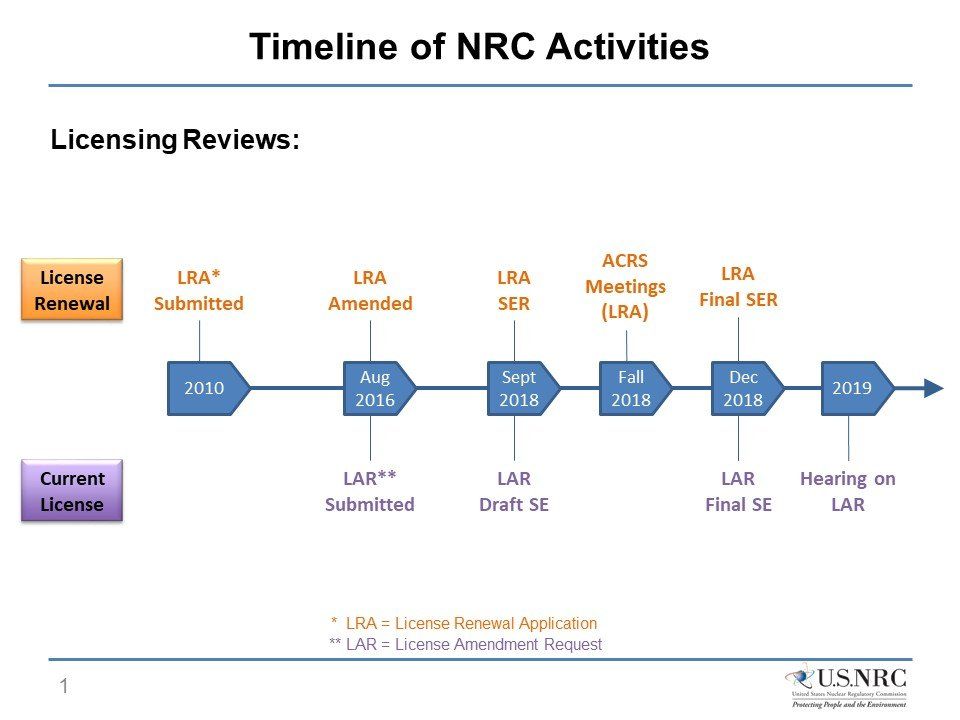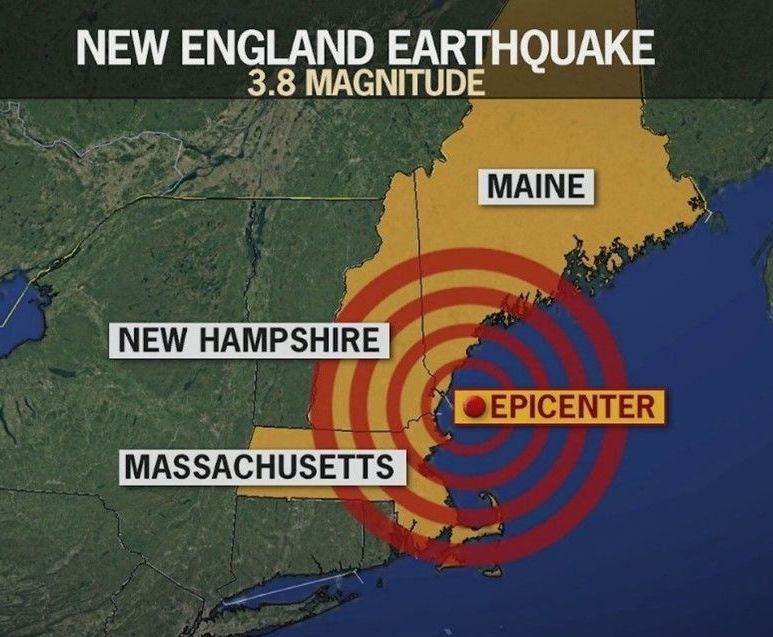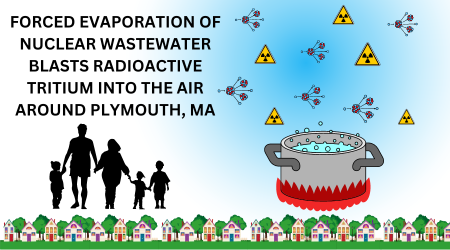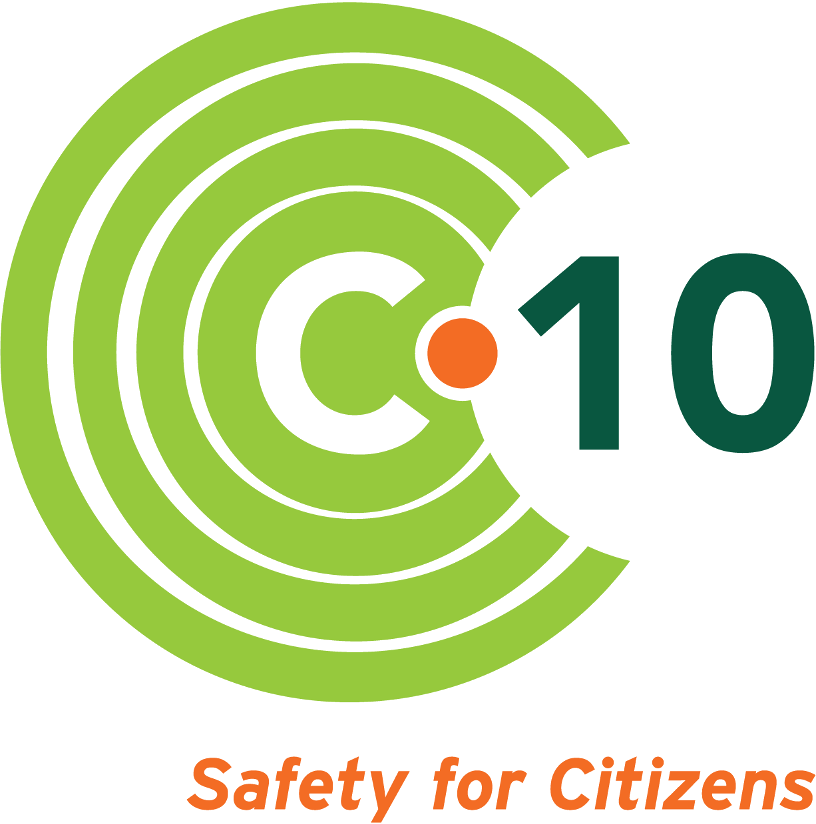Why is the NRC in such a hurry to grant a license extension for Seabrook?
- By Diane Teed and Chris Nord, C-10 board members
- •
- 19 Nov, 2018
Navigating a flawed process, while concrete continues to degrade

C-10 Research and Education Foundation (C-10), a Newburyport, Mass. nonprofit, is the only intervenor in a federal proceeding regarding concrete degradation at the Seabrook Station nuclear plant in coastal New Hampshire. We were also also the only citizens group to comment at a recent meeting of the Advisory Committee on Reactor Safeguards (ACRS), an independent body of experts convened by the U.S. Nuclear Regulatory Commission (NRC) in Rockville, Maryland on October 31.
The ACRS met to discuss plans to manage the serious problem of failing concrete at Seabrook, and implications for the plant’s existing license, as well as its request for a 20-year license extension. C-10 board member Chris Nord traveled to Rockville to represent us in this important meeting. Other participants included NextEra Energy Seabrook, LLC and their engineering consultants, MPR Associates and Simpson, Gumpertz & Heger, as well as members of the NRC’s Office of Nuclear Reactor Regulation.
BUREAUCRACY VS. DEMOCRACY
“The overwhelming impression for me was the bureaucratic bias built into the NRC’s process, to protect and ensure final approval of the license extension for Seabrook,” said Nord, a resident of Newbury, Mass. As is illustrated in NRC’s timeline the agency separates the License Amendment Request (LAR) proceeding on Seabrook’s concrete from the track on the plant’s License Renewal Application (LRA), which seeks to extend the existing license from 2030 to 2050.
“While this in itself may seem legitimate—since the LAR is treated as part of the current license—one can see that the crucial ACRS meeting, and the final version of the NRC’s Safety Evaluation regarding the plant’s concrete aging management plan (expected in December), take place far earlier than the public hearing on the License Amendment Request, which is slated for next summer,” noted Nord.
“So, while members of the ACRS—many of whom admitted having no real expertise in concrete structural science—asked their prepared questions for which NextEra had its ready answers, C-10 is still many months away from being able to support our contentions relative to LAR with the testimony of our expert witnesses,” said Nord.
“The result of this skewed process is that the NRC will effectively minimize the impact of our concerns with the LAR—even though the legitimacy of the LAR should have direct bearing on Seabrook’s merit for license extension. And since the independent experts we shall bring into the LAR argument represent the only truly independent peer review of the testing and modeling of the concrete, it seems all the more wrong-headed to judge the qualification of Seabrook for a license extension before C-10 can have our day in court at next year’s public hearing,” Nord concluded.
LISTENING IN...
"l listened to the meeting for the better part of ten hours,” said C-10 board member Diane Teed, of West Newbury, Mass. “I was extremely proud and grateful that Chris made the trip—not only on behalf of C-10, but also in the interest of all the people impacted by operations at Seabrook Station nuclear power plant.”
According to those from C-10 who called in to the meeting, it was a day full of engineering details and self-congratulating by NextEra and the NRC over their establishment of a plan to manage alkali-silica reaction (ASR)—not only in the near-term, but over the proposed extended license period until 2050. Testimony included discussions of building deformation, large cracking, and the impact of ASR on structural integrity that could reduce margins of safety.
“Chris raised specific concerns to the Advisory Committee, including the lack of representativeness of testing conducted by NextEra at the Ferguson Structural Engineering Laboratory at the University of Texas at Austin (FSEL) versus actual conditions at Seabrook, the lack of peer review of test results, and by asserting that the term ‘reasonable assurance’ is a woefully inadequate standard in protecting citizens from exposure to some of the most toxic substances on earth," Teed commented.
AND DOING OUR HOMEWORK
The nexus of the research and analysis that C-10 is currently conducting on the plant’s License Amendment Request (LAR) and the recent ACRS hearing on the License Renewal Application (LRA) is alkali-silica reaction—a progressive, irreversible type of concrete degradation impacting safety structures throughout the Seabrook property. Both pending requests to NRC are heavily reliant on the results of tests at the Texas lab conducted in 2012.
C-10 has been researching ASR since 2010, soon after the problem was disclosed by Seabrook owner NextEra. We switched to high gear upon being granted intervenor status by the NRC’s Atomic Safety and Licensing Board (ASLB) on October 6, 2017 as a result of contentions we filed in April of that year. We argued that the public is placed at serious risk by allowing NextEra to continue to operate Seabrook Station with no way to adequately remedy the plant's deteriorating concrete.
“Our preparation has entailed literally thousands of hours of work. Within the past 13 months, we have enlisted a trusted team that has entered into non-disclosure agreements in order to analyze proprietary documents from NextEra and the NRC. We have held meetings to establish our strategy, read expert opinions, researched and interviewed technical experts,” explained Teed.
C-10 recently engaged Professor Victor Saouma of the University of Colorado, Boulder—a structural engineer who is also an expert in the problem of ASR at nuclear plants—to assess results of the FSEL testing, as well as the assumptions put forth by NextEra and the NRC.
TO WORK FOR YOUR SAFETY
“You may wonder, ‘what can a citizens group do against a well-financed corporation with nuclear engineering credentials?’” said Teed. Her answer: “We can do plenty. C-10's mission is to protect the safety of citizens and the environment near Seabrook Station. To that end, we are working tirelessly for you.”
“We sacrifice time with our families and volunteer our time because we recognize the importance of this endeavor. We can’t not do this,” said Teed. “We are proud of the knowledge we have built, and that we already have expert support for key elements of our arguments against the representativeness of the testing that underpins Seabrook’s License Amendment Request.”
The NRC has repeatedly promised—in writing—to local officials throughout the plant’s 10-mile emergency planning zone that "NextEra will also need to clearly establish that the results of its large-scale test program are representative of actual conditions at Seabrook." (emphasis added).
“We believe our standards on this issue exceed those held by the NRC. We will continue our fight for the public's safety,” said Teed. Read C-10’s written comments to the Advisory Committee on Reactor Safeguards here.
© C-10 Research and Education Foundation 2025 C-10 is a registered 501(c)(3) nonprofit. Tax ID/EIN #22-3117209.



